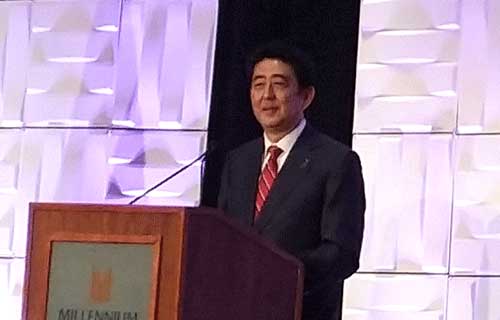 Japan's Prime Minister Shinzo Abe speaking at a co-sponsored luncheon of the Los Angeles World
Japan's Prime Minister Shinzo Abe speaking at a co-sponsored luncheon of the Los Angeles WorldAffairs Council and the Japan America Society
Japanese Prime Minister Shinzo Abe made a strong declaration that Japan under his leadership will take a more proactive role in maintaining peace and security in East Asia, and he also vowed to push through the economic reforms that Japan's economy needs to resume a path of growth. Abe's program to renew Japan has been closely watched around the world after a quarter century of little forward momentum in the country. Speaking mostly in Japanese over a lunch at the Biltmore Hotel, he broke into English to issue an invitation: "Please come and see a new Japan."
Abe also displayed his robust sense of humor, explaining why he was the first Japanese prime minister in a long time to visit Los Angeles: his recent predecessors, he said, would all make their first trip to Washington DC, "and then they would all lose their job within one year," so they never got the chance to come back and visit other US cities. "But fortunately I have had this position for two and a half years, so I am in a position to visit other cities." And he also said that although much has changed since he came to LA to study in 1977, some things remain the same - "the uniforms of the Highway Patrol are the same...and the governor [Jerry Brown] is still the same..."
His main message was to showcase a reinvigorated Japan. "When I came to the US two years ago I said Japan is back, and promised that the Japan-US alliance would be revitalized. Today the alliance stands on a rock-solid foundation... I call this alliance an alliance of hope, an alliance that can deal with global issues, like climate change, infectious diseases and responses to natural disasters."
Abe also responded to questions from Los Angeles World Affairs Council President Terry McCarthy about Japan's role in the world and its enhanced defense relationship with the US, as well as about "Abenomics." In response to a question about the strengthening of the US-Japan defense agreement that was announced this week, Abe said that much had changed in the 18 years since the US-Japan pact was last updated, including the proliferation of weapons of mass destruction, cyber attacks and the emergence of extremism. "Today those threats can cross national borders - which means that no single country is able to defend its peace and security by its own means. Under these circumstances I strongly advocated what I call a proactive contribution to peace - which is based on the principle of international cooperation." Abe said Japan has been "doubling its efforts" to ensure peace and security in the Asian region, in close cooperation with the US. "The US has adopted a re-balance policy, shifting towards the Asia-Pacific region, while our country is taking an approach of proactive contribution to peace." Abe said that with the new US-Japanese defense pact, which allows Japan to come to the defense of the US, "obviously the alliance's capacity for deterrence and contingency response have been further enhanced, and this guideline will be instrumental with improving security in the region."
The prime minister said that negotiations over the 12-nation Trans Pacific Partnership (TPP) trade pact "are in their final stretch." He said that in the context of the rapid economic growth of the Asia-Pacific region, the TPP "is going to establish the economic regulations for the 21st century" - regulations that can be applied all across the world.
Abe's economic program, dubbed "Abenomics", consists of three so-called "arrows" -monetary easing, increased spending and deep structural reform. The first two arrows have largely succeeded, with the Nikkei stock average surging and the value of the yen depreciating against the dollar, which helps Japan's exports. Abe said he was often criticized about the third arrow - "that this arrow has missed its target... However I have to say this - I was a member of the archery team in university, so my arrow will definitely hit the target!" He said that in the current Diet session there are a number of bills being debated, including reform of the electricity and power market. He said they had already decided to change the regional monopolies that exist in the retail market. "And for many years there was no way really to make reforms in the structure of farmers and the agricultural cooperatives." They are committed to changing that too. "That means I am ready to reform the so-called federal regulations that do exist in such sectors as agriculture, healthcare, energy and employment."
He added that "as the population shrinks we are going to use the foreign, non-Japanese skilled workers, and in addition to them we will leverage the potential of women." He said that there were still far too few Japanese women in executive positions in Japan's listed companies, but he has been trying to get Japanese managers to change that. I try to persuade Japanese management by telling them that Lehman Brothers went under in the financial crisis, but if the name had been Lehman Brothers and Sisters it would not have collapsed!"
He said that he had just come from a visit to Silicon Valley, where he was struck by the speed with which change and transformation is taking place. "We would like to learn from those experiences," he said. That is what will help to produce a new Japan.
